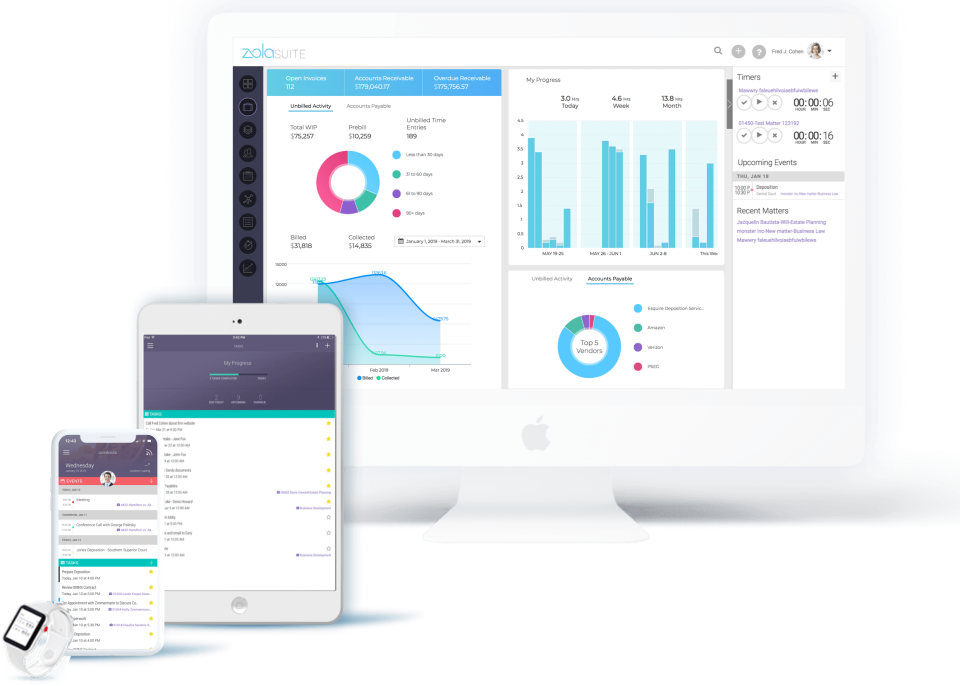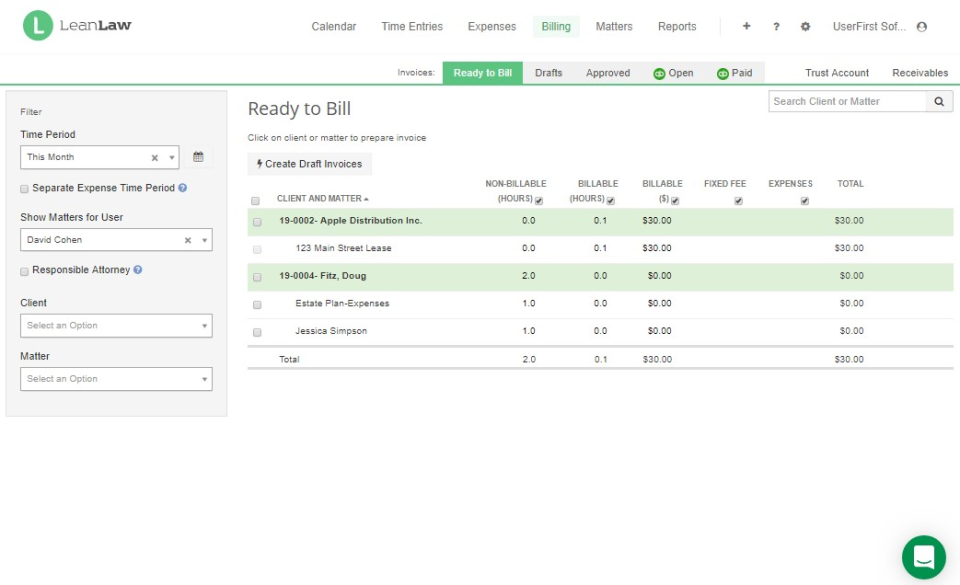More firms are going digital to accommodate remote workers, meet client expectations, and increase efficiency.
The legal industry has traditionally been hesitant to adopt new technology. Like many other industries, however, the pandemic made it necessary for firms to invest in new tech to keep things running while remote and meet clients’ new, digital-fueled expectations
But change can be a good thing: Many small to midsize law firms across the country, practicing all different types of law, report seeing improvements in efficiency after adopting legal technology.
“Technology is no longer seen as insurmountable or as a boogeyman,” said Rick DeMedeiros, founder of DeMedeiros Injury Law in Atlanta. “More lawyers are embracing technology not just as a resource, but as a necessity to help them thrive.”
Here are three legal technology trends on the rise, and how your firm, regardless of the type of law you practice, can use new technology to excel now and in the future.
1. Choose cloud-based software over on-premise software
Software generally comes one of two ways: Either it's installed onto your machines or server or you can access it via the cloud online.
With more people than ever working remotely, companies see the benefit of cloud-based software their employees can access from anywhere, and law firms are no exception. Some of these benefits include:
Being able to access documents remotely
Using access controls to keep confidential documents secure
Organizing documents and information so they’re easier to find for remote teams
Being able to access security and updates that keeps data safe
Less of an upfront cost compared to an on-premise solution
According to Capterra’s 2021 Legal Management Survey*, 56% of attorneys surveyed report more than half of the software solutions they use are cloud-based.
According to DeMedeiros, this is especially true of legal case management software.
“Absolutely everything is trending toward cloud-based software,” DeMedeiros said. “Despite the pandemic coming to an end in the near future, most lawyers want resources that will allow them to work from anywhere in the world.”
Most legal case management software is cloud-based or offers a cloud-based option, which makes it easy for lawyers to transition from the office to at home or on-the-go.

Zola Suite is a legal case management software platform that is cloud-based, which allows users to access their account and data from multiple devices. (Source)
Interested in legal case management software?
Check out our legal case management software buyers guide to help inform your software search.
2. Invest more in marketing software
Marketing has always been important to law firms, but now, as more of the world continues online post-COVID, it’s more important than ever to not only remain visible online but also build trust with clients through consistent communications.
Seth Price, founding partner of the firm Price Benowitz LLP, said his firm realized they needed to invest more in marketing when the firm started to grow. They wanted to improve their client experience and decided to invest in customer relationship marketing (CRM) software.
And Price says they’ve definitely seen benefits, including:
Streamlined workflows
Better insight into client needs
Improved forecasting
Overall, the law firm’s strategies became more client-focused when it started using CRM software.
“Marketing can help law firms differentiate themselves when speaking to clients, and build longer-lasting relationships with them,” Price said. “It's not just about improving visibility for your firm, but actually connecting with your clients.”
Price’s firm decided to use Law Ruler, since it’s a law practice management tool with CRM functionality, catering directly to those in the legal profession.
Interested in law practice management software?
Check out our law practice management software buyers guide to help inform your search.
3. Automate routine and administrative tasks
A whopping 86% of attorneys say they spend too much time on administrative tasks and not enough time practicing law.
Tim Nitsch, lawyer and partner with KCO Legal, Inc. in Naperville, IL., sees the legal industry shifting away from the billable hour structure as clients want more transparency in what they will pay and as technology changes how legal professionals spend their time.
Instead, Nitsch predicts lawyers will be paid a salary and work on fixed fee projects.
“Billable hour requirements reward inefficiency,” Nitsch said. “As law firms move to fixed fee payment, efficiency becomes critical. Automation will be the way forward for law firms to become more efficient and profitable.”
According to Capterra’s research, 74% of firms have already attempted to automate tasks. And most firms have seen improvement in the tasks they automated.
By automating some of these administrative tasks, attorneys can get back to what they do best, and not waste time on tasks such as:
Scheduling meetings
Project management
Client intake
Sending invoices
Software, such as legal billing software, also allows users to set up recurring invoices and reminders.
Interested in legal billing software?
Check out our legal billing software buyers guide to help inform your search.
Legal technology trends can help prepare your firm for the future
Legal technology and software presents a lot of opportunities for those in the legal profession. Firms can use technology to automate routine tasks so that lawyers can spend more time practicing law, market their law firm to build a stronger clientele base, and make their work more accessible when working remotely.
Lastly, as your firm goes digital, you’ll want to consider how your firm will keep its data and information secure against ransomware and cyberattacks.
Check out Capterra's Legal Resource Center to explore other related content

Methodology
Capterra's 2021 Legal Management Survey was conducted in May, 2021 among 401 legal professionals (240 of whom were attorneys) to learn more about law firm automation, security, and other practices. Respondents were screened for full-time employment at small (one to 14 attorneys) and midsize (15-49 attorneys) law firms. The survey excluded solo practitioners without employees.
Note: The applications selected in this article are examples to show a feature in context and are not intended as endorsements or recommendations. They have been obtained from sources believed to be reliable at the time of publication.

